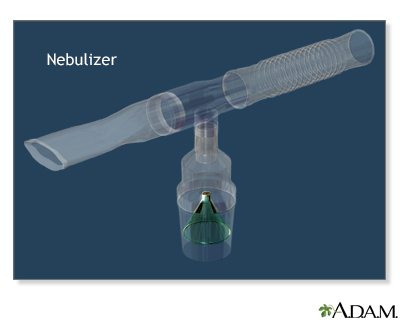| Drug delivery devices: Nebulizers |
Sometimes called a "breathing treatment," a nebulizer creates a mist out of your asthma drug, which makes it easy and pleasant to breathe the drug into the lungs. If you use a nebulizer, your doctor will prescribe the drugs in liquid form, instead of in a canister.

To use a nebulizer, you attach the nebulizer hose to an air compressor, a small machine that takes air from the environment and turns it into a high-pressure stream. The drug is placed into a small cup. Air from the compressor converts the drug into an aerosol mist that you inhale through a mouthpiece. By taking slow, deep breaths, the medicine is delivered into your lungs. Small children or others who cannot hold the mouthpiece tightly in their lips can wear a mask to maximize the effects of the medicine.
Most compressors are small and lightweight, making them easy to use at home or away, and are compatible with any nebulizer kit. However, some nebulizers don't use air compressors. These are called "ultrasonic nebulizers," which use sound vibrations to create the drug aerosol. These units are quieter but more expensive.
Unlike a metered dose inhaler, which only takes a couple of minutes or less to use, a nebulizer requires you sit down and relax for 5 - 30 minutes while you inhale the drug. Some people enjoy the experience of using a nebulizer, others don't have the patience.
Nebulizers require time and effort to keep them clean and operating properly. For most patients with asthma, a nebulizer is not necessary and other delivery methods like MDIs are appropriate.
Reviewed By: Allen J. Blaivas, DO, Clinical Assistant Professor of Medicine UMDNJ-NJMS, Attending Physician in the Division of Pulmonary, Critical Care, and Sleep Medicine, Department of Veteran Affairs, VA New Jersey Health Care System, East Orange, NJ. Review provided by VeriMed Healthcare Network. Previoulsy reviewed by David A. Kaufman, MD, Section Chief, Pulmonary, Critical Care & Sleep Medicine, Bridgeport Hospital-Yale New Haven Health System, and Assistant Clinical Professor, Yale University School of Medicine, New Haven, CT. Review provided by VeriMed Healthcare Network. (6/1/2010)
